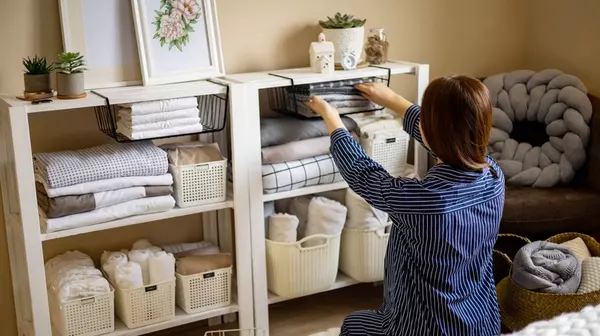Latest Blog Topics
Selling My House Quickly: 10 Proven Strategies for a Fast Sale
Selling your home can be both an exciting and overwhelming experience, especially if you're aiming for a quick sale. Whether you're a first-time seller, a middle-aged homeowner looking to downsize, or someone relocating for a new job opportunity, these proven strategies will help you navigate the process smoothly and efficiently.
1. Price It Right from the Start
Setting the right price is crucial to attracting buyers quickly.
Avoid Overpricing: Overpricing can deter potential buyers who might assume you're unwilling to negotiate or not serious about selling.
Consult Professionals: Get a professional appraisal or advice from a trusted real estate agent who understands the local market dynamics.
Research the Market: Analyze recent sales of comparable homes in your area to gauge a competitive price point.
Consider Psychological Pricing: Pricing your home just below a round number (e.g., $299,000 instead of $300,000) can make it appear more attractive.
2. Boost Your Home's Curb Appeal
First impressions are lasting impressions.
Fresh Paint: A new coat of paint on the exterior can make your home look fresh and well-maintained.
Landscaping: Trim overgrown bushes, mow the lawn regularly, and plant colorful flowers to enhance visual appeal.
Clean Entryway: Ensure your front door is clean or freshly painted, replace worn-out doormats, and consider adding potted plants for a welcoming touch.
Upgrade Lighting: Install attractive outdoor lighting to highlight your home's features during evening showings.
3. Declutter and Depersonalize
Help buyers envision themselves living in your home.
Remove Personal Items: Take down family photos, personal collections, and unique artwork that might not appeal to everyone.
Organize Spaces: Tidy up closets, cabinets, and storage areas; buyers often peek inside to assess storage capacity.
Minimize Furniture: Remove excess furniture to make rooms appear larger and more open.
Neutralize Decor: Opt for neutral colors and decor styles that appeal to a broader audience.
4. Make Necessary Repairs
Address minor issues before they become deal-breakers.
Fix Leaks and Squeaks: Repair leaky faucets, running toilets, and lubricate squeaky doors or windows.
Replace Broken Items: Swap out cracked tiles, damaged countertops, or faulty light fixtures.
Update Hardware: Install modern handles, knobs, and faucets to give rooms an updated look.
Check Electrical Systems: Ensure all outlets and switches are functioning properly.
5. Stage Your Home Professionally
Showcase your home's full potential.
Hire a Stager: Professionals can arrange furniture and decor to highlight your home's best features and maximize space.
Create Inviting Spaces: Set up rooms to showcase their intended use, such as a home office or a cozy reading nook.
Enhance Lighting: Use a mix of natural and artificial lighting to create a warm and inviting atmosphere.
Add Finishing Touches: Incorporate fresh flowers, stylish accessories, and tasteful artwork to enhance appeal.
6. Use High-Quality Photos and Videos
Capture buyers' attention online where most searches begin.
Professional Photography: Invest in a skilled photographer who knows how to showcase homes effectively.
Virtual Tours: Offer 3D walkthroughs or video tours to accommodate remote buyers and increase engagement.
Highlight Features: Showcase unique aspects like a fireplace, renovated kitchen, or spacious backyard.
Optimize for Web: Ensure images and videos are high-resolution but load quickly on websites and mobile devices.
7. Be Flexible with Showings
Accessibility can make or break a quick sale.
Accommodate Requests: Allow for evening and weekend viewings to cater to buyers' schedules.
Keep It Show-Ready: Maintain cleanliness and tidiness at all times to be prepared for last-minute showings.
Consider Open Houses: Host open house events to attract multiple buyers simultaneously and create a sense of urgency.
Provide Easy Access: Use a lockbox system to make it convenient for agents to show your home when you're not around.
8. Offer Attractive Incentives
Give buyers a reason to choose your home over others.
Cover Closing Costs: Offer to pay a portion or all of the buyer's closing costs to reduce their upfront expenses.
Include Warranties: Provide a home warranty that covers major appliances and systems for the first year.
Leave Appliances: Consider including high-end appliances, like a refrigerator, washer, and dryer, in the sale.
Flexible Move-In Dates: Be accommodating with the closing date to suit the buyer's timeline.
9. Choose the Right Real Estate Agent
An experienced agent can expedite the selling process.
Local Expertise: Select an agent familiar with your neighborhood and market trends.
Proven Track Record: Look for someone with a history of quick sales and satisfied clients.
Marketing Skills: Ensure they have a robust marketing plan, including online listings, social media promotion, and networking.
Good Communication: They should keep you informed every step of the way and be responsive to your questions and concerns.
10. Leverage Social Media and Online Platforms
Maximize your home's visibility to reach more potential buyers.
Share Listings Online: Post your home on platforms like Facebook, Instagram, and Twitter with engaging descriptions and images.
Use Real Estate Websites: List on popular sites like Zillow, Trulia, and Realtor.com to tap into a larger audience.
Create a Virtual Open House: Host live video tours on social media platforms to interact with prospective buyers in real-time.
Engage Your Network: Encourage friends, family, and colleagues to share your listing to expand your reach organically.
Selling your house quickly doesn't have to be a daunting task. By implementing these strategies, you'll position your home to attract eager buyers and close the deal in no time. Remember, preparation and presentation are key. Here's to a smooth and successful sale!
Keep Your Home in Top Shape: Essential Post-Sale Home Maintenance Tips
Congratulations! You’ve just closed the deal and moved into your new home. While the hard part might seem over, the journey of homeownership has only just begun. Now it’s time to ensure your home stays in tip-top condition with some essential post-sale maintenance. Whether you’re a first-time homeowner or a seasoned pro, these tips will help you protect your investment and enjoy a worry-free living experience. Let’s dive in!
1. Start with a Thorough Inspection
Before you get too comfortable, it’s crucial to conduct a thorough inspection of your new home. While you likely had an inspection before buying, taking a closer look now can help you catch any issues that might have been missed or developed since. Check for leaks, cracks, and any signs of wear and tear. Identifying and addressing these early can save you time and money down the road.
Inspect for leaks, cracks, and signs of wear.
Check the roof, foundation, and plumbing for any potential issues.
Schedule professional inspections for HVAC, electrical, and pest control.
2. Create a Seasonal Maintenance Schedule
Your home requires ongoing care, and the best way to stay on top of it is by creating a seasonal maintenance schedule. This ensures you’re addressing necessary tasks at the right time of year. For instance, in the spring, you might focus on cleaning gutters and inspecting the roof, while in the fall, you’ll want to prepare your heating system and clean out the chimney. A proactive approach helps prevent small issues from becoming big problems.
Develop a maintenance schedule that covers each season.
Prioritize tasks like gutter cleaning, HVAC servicing, and roof inspections.
Stay ahead of the game by setting reminders for each task.
3. Prioritize Energy Efficiency
One of the best investments you can make in your new home is enhancing its energy efficiency. Not only does this reduce your utility bills, but it also adds value to your property. Start by sealing any drafts around windows and doors, upgrading to energy-efficient appliances, and considering adding insulation to your attic. These small changes can lead to significant savings over time.
Seal drafts around windows and doors to prevent energy loss.
Upgrade to energy-efficient appliances to save on utility costs.
Consider adding insulation for better temperature control and energy savings.
4. Keep Up with Routine Maintenance
Routine maintenance is the key to keeping your home in excellent condition. This includes tasks like changing air filters, checking smoke detectors, and servicing your HVAC system regularly. Don’t forget about the exterior—cleaning the siding, maintaining the lawn, and ensuring proper drainage around the foundation are just as important. Consistency is key, and a little effort now can save you major headaches later.
Change air filters and check smoke detectors regularly.
Service your HVAC system annually to ensure it runs efficiently.
Maintain the exterior by cleaning siding, managing landscaping, and checking drainage.
5. Prepare for Emergencies
No one likes to think about emergencies, but being prepared is essential. Make sure you have a plan in place for things like power outages, plumbing leaks, or severe weather. Keep a well-stocked emergency kit, know where your main shut-off valves are, and have contact information for reliable contractors on hand. Being prepared can make all the difference when an unexpected issue arises.
Create an emergency plan for power outages, leaks, and severe weather.
Keep an emergency kit with essentials like flashlights, batteries, and first aid supplies.
Know the location of main shut-off valves and have a list of trusted contractors.
In Summary
Taking care of your home doesn’t end when you get the keys—it’s an ongoing process that ensures your investment remains safe, comfortable, and valuable. By following these post-sale maintenance tips, you can enjoy peace of mind knowing your home is in great shape. Remember, a well-maintained home not only saves you money but also enhances your quality of life.
Ready to Keep Your Home in Top Shape?
Whether you’re looking for advice on seasonal maintenance or need recommendations for trusted contractors, I’m here to help. Contact me today to ensure your home stays in perfect condition for years to come!
What You Need to Know: Essential Disclosures When Selling Your Home
Selling your home can be an exciting yet complex process, especially when it comes to the legalities involved. One of the most crucial aspects is making the necessary disclosures to potential buyers. These disclosures aren’t just about following the law—they’re about ensuring a smooth transaction and building trust with your buyer. But what exactly do you need to disclose, and why is it so important? Let’s break it down!
1. Understanding the Importance of Disclosures
Disclosures are all about transparency. When you sell your home, you’re required to provide potential buyers with information about the property’s condition. This helps buyers make informed decisions and protects you from potential legal issues down the line. Failing to disclose known issues can lead to lawsuits, canceled contracts, or a tarnished reputation as a seller.
Disclosures provide transparency and build trust with buyers.
Protect yourself from legal issues by disclosing known problems.
Ensure a smooth transaction by being upfront about your home’s condition.
2. Common Disclosures You Must Make
While disclosure requirements can vary depending on your location, some issues are commonly required to be disclosed everywhere. These include:
Structural Problems: Any known issues with the foundation, roof, or major systems like plumbing and electrical.
Water Damage: Past or present leaks, flooding, or mold problems should be disclosed.
Pest Infestations: If your home has had issues with termites, rodents, or other pests, it needs to be mentioned.
Hazardous Materials: Lead paint, asbestos, and radon are common concerns that must be disclosed.
Legal Issues: Property liens, boundary disputes, or zoning violations should be clearly communicated.
Structural problems: Foundation, roof, plumbing, and electrical issues.
Water damage: Past or present leaks, flooding, or mold.
Pest infestations: Termites, rodents, or other pests.
Hazardous materials: Lead paint, asbestos, or radon.
Legal issues: Property liens, boundary disputes, or zoning violations.
3. Local and State Disclosure Requirements
It’s important to understand that disclosure requirements can vary significantly depending on where you live. Some states have very specific forms and questions that sellers must fill out, while others may require less formal disclosures. To ensure you’re compliant, it’s essential to familiarize yourself with your local laws or consult with a real estate professional who knows the ins and outs of your area’s requirements.
Disclosure requirements vary by state and locality.
Some areas have specific forms that must be filled out.
Consult with a real estate professional to ensure compliance with local laws.
4. How to Present Disclosures to Buyers
When it comes to presenting disclosures, the key is to be honest and thorough. Providing detailed information up front can prevent misunderstandings and build trust with potential buyers. Typically, disclosures are provided in writing, either as part of the contract or in a separate document. It’s a good idea to keep a copy of all disclosures and any related documents, just in case any issues arise later.
Be honest and thorough in your disclosures to prevent misunderstandings.
Provide disclosures in writing, either in the contract or as a separate document.
Keep copies of all disclosures for your records.
5. The Role of a Real Estate Agent
Navigating disclosures can be tricky, which is why working with a knowledgeable real estate agent is invaluable. A good agent will guide you through the disclosure process, ensuring that you meet all legal requirements and helping you present the information in a way that’s clear and professional. They can also provide advice on how to address any issues that might be a red flag for buyers.
A real estate agent can guide you through the disclosure process.
Ensure all legal requirements are met with the help of a professional.
Get advice on addressing potential red flags for buyers.
In Summary
Disclosures are a vital part of selling your home, ensuring transparency and protecting both you and the buyer. By understanding what needs to be disclosed, complying with local laws, and working with a real estate professional, you can navigate this aspect of the sale with confidence. Remember, honesty is the best policy when it comes to selling your home—so be upfront and clear to avoid any issues down the road.
Ready to Sell? Let’s Make It Smooth and Stress-Free!
If you’re thinking about selling your home and want to ensure you’re covering all your bases with disclosures, I’m here to help. Contact me today for expert advice and a smooth, successful selling experience.
Denell Hoggard
Phone:+1(702) 217-1166




